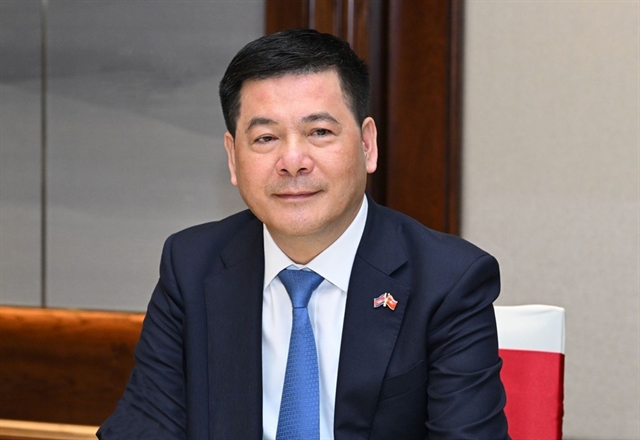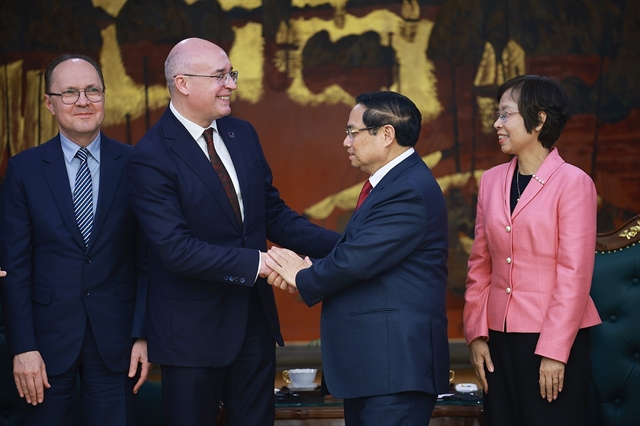 Talking Shop
Talking Shop

 |
| Minister of Industry and Trade, Nguyễn Hồng Diên |
HÀ NỘI The Ministry of Industry and Trade (MoIT) aims to enhance trade and export promotion with key markets, maximising export opportunities and leveraging the effectiveness of Free Trade Agreements (FTAs). Despite the challenges and uncertainties in the global economy, the ministry recognises the importance of meeting targets set in the Five-Year Plan (2021-2025) for Việt Nam's open and globally dependent economy. To achieve these goals, the industry and trade sector will exert exceptional efforts. Minister of Industry and Trade, Nguyễn Hồng Diên, discussed strategies to accomplish these tasks with Vietnam News Agency reporters.
Trade promotion activities in 2023 achieved remarkable success by effectively leveraging opportunities presented by trade agreements. How has the MoIT demonstrated its role in State management in this field? Can you suggest which opportunities should be capitalised on and what challenges need to be overcome in 2024?
Trade promotion, through the National Trade Promotion Programme, has been carried out effectively with a focus on diversifying markets and export products, as well as maximising opportunities from free trade agreements (FTAs) and fostering regional and inter-regional trade. This approach ensures stable and long-term markets for exports, contributing to overall economic efficiency. It also helps businesses secure reliable sources of raw materials, explore new markets and partners, leverage FTAs, strengthen international connections, and participate actively in the global value chain.
Looking ahead to 2024, we anticipate complex and unpredictable changes in the global landscape, presenting both opportunities and challenges. As a highly open economy, Việt Nam cannot avoid the adverse effects of external fluctuations, considering the significant risks and challenges that lie ahead in the global economic outlook.
To effectively seize opportunities and proactively tackle challenges in 2024, the MoIT will prioritise trade and export promotion with key markets, maximising export potential and the benefits of FTAs. Additionally, we will collaborate with relevant stakeholders to support businesses in expanding trade promotion efforts in new and potential markets that they may not have directly accessed before. Furthermore, we will prioritise activities that provide market information and trade opportunities to increase market share in traditional markets, while exploring untapped markets.
We will also enhance support for centralised, large-scale trade promotion events that connect regions and focus on industries with regional strengths in target markets. By pooling resources from various stakeholders such as ministries, branches, localities, businesses and international organisations, we aim to effectively combine trade promotion with investment, culture and tourism promotion.
Moreover, we will continue to develop national brands, industry brands, and product brands through initiatives like the selection of Vietnamese national brands in 2024. We will promote products that have achieved national brand status domestically and internationally, while improving trade promotion capabilities linked to brand development at different levels (national brand, industry brand, and product brand) in conjunction with geographical indications. This approach aims to increase added value and foster sustainable exports, enabling Vietnamese businesses to participate more deeply in high-value stages of the global value chain.
Additionally, the MoIT will actively promote multilateral cooperation within organisations where we are members, such as the ASEAN-Japan Centre, ASEAN-Korea Centre, and Asia Trade Promotion Forum, to strengthen our participation in multilateral activities. We will also work towards signing memorandums of understanding (MOUs) in trade promotion with foreign trade promotion agencies that are currently under negotiation or have agreed upon content, such as Australia and Chile.
The rise in export trade fraud cases and the increasing imposition of trade barriers by countries pose challenges for businesses. What valuable advice can you offer, particularly to export businesses in 2024?
With the Party's sound policy on international economic integration, export has become a key driver of economic growth. Việt Nam has emerged as one of the world's top 20 economies in terms of trade volume. However, our exported goods face growing scrutiny and trade defence measures from foreign countries.
As of December 2023, Việt Nam's exports have been subjected to 240 trade defence investigations by 24 markets. The investigations cover a wide range of products, including high-value items like wooden cabinets, plywood, solar batteries, shrimp and pangasius fish, as well as lower-value products such as foam mattresses, lawn mowers, cigarette wrappers, EPS plastic beads and honey. In 2023 alone, we faced 13 new investigations, in addition to ongoing reviews of existing cases.
To mitigate risks and minimise the negative impacts of trade defence investigations, the MoIT advises businesses, especially export-oriented enterprises in 2024, to diversify their export markets and product offerings. It is crucial to understand the legal regulations and practices related to trade defence investigations and take measures to avoid evading the trade defence measures imposed by importing countries.
Enterprises should closely monitor early warning information and tailor their export strategies accordingly. Establishing effective communication channels with import partners, industry associations and related sectors is essential for promptly addressing lawsuits and emerging situations.
Furthermore, businesses should enhance competitiveness through product quality rather than solely relying on price competition. Improving the value chain of products and increasing the utilisation of domestically sourced materials or materials not subject to trade defence measures by the importing country is recommended. Higher value-added products created within the enterprise should be prioritised.
Implementing a transparent and traceable management system for raw materials, with robust data linkage based on raw material bills, is crucial. Maintaining accounting records following international standards and retaining all invoices and documents can help prove compliance and prevent allegations of evasion during investigations.
In the event of an investigation by the importing country, enterprises should develop a comprehensive and consistent strategy for handling the case and allocate necessary resources accordingly. Full cooperation, timely provision of information and requested documents to foreign investigating agencies, and close coordination with the MoIT throughout the process are vital to ensure effective guidance and support.
What are your expectations for 2024?
In 2024, we are determined to achieve the goals outlined in the 5-year socio-economic development plan for 2021-2025. Despite the challenges posed by the COVID-19 pandemic and global geopolitical fluctuations, we remain focused on maintaining macroeconomic stability, promoting growth, and creating a favourable investment and business environment.
Reputable international organisations have expressed positive evaluations and forecasts for Việt Nam's economic prospects in 2024. To stimulate domestic production and business, the Government will continue to prioritise the acceleration of public investment disbursement. This will have a significant impact on industries such as steel, construction materials and mechanics.
In 2023, various policies were implemented to address difficulties faced by enterprises, setting the stage for further promotion of production and business in 2024. Flexible fiscal and monetary policies, interest rate reductions, and tax and fee reductions will continue to boost production and consumption.
Export activities are expected to show positive signs of recovery, especially with the effective utilisation of existing FTAs. The conclusion and implementation of FTAs with new markets such as Israel and the UAE will provide additional opportunities for trade, investment and exports. Strengthened political relations with major partners like China, the US and the EU will serve as important foundations for expanding economic co-operation and increasing trade and investment. VNS




